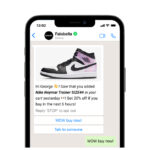B2B organizations around the globe have discovered the advantages of digitizing their payments processes.
B2B advertisement firms, for example, took note of the digital-first mindset of clients who employ their services and have now reaped the many benefits of electronic payments systems. Approximately one-third of companies already incorporated B2B payments into their transaction processes as of 2020, and almost double that share said they are prioritizing the migration from checks to electronic payments for B2B clients.
“Some [businesses] were increasing their budget [for digital advertising] massively and some were putting it on hold, depending on the niche of the business they were promoting,” explained Shahar Jacobi, CEO of self-service advertising platform BidVertiser.
Advertising firms have led the charge in payments automation. More than 68% of all agencies already have prioritized their collections efforts with automated processes, according to PYMNTS research.
“Affiliate marketers usually respond fast to the situation, trying to find the next big thing [such as masks] as soon as possible,” said Jacobi.
For this reason, a new sense of urgency emerged for B2B advertisers, and it became imperative for agencies to minimize the follow-up time for collections or risk interrupting their cash flow. The average days sales outstanding (DSO) rate for advertising agencies is 11, whereas the average for all other businesses is 42.5 days.
B2B Clients Demand More Payment Options
The pandemic revealed weak spots in many businesses’ payments infrastructures, and widespread adoption of numerous payment methods occurred over the past 19 months as a result.
“[BidVertiser] started with the straightforward payment methods — credit cards and PayPal — but we have discovered very quickly that those two are not enough,” said Jacobi. “We have received numerous requests to add more payment methods, and [we] were somewhat surprised to see that Eastern Europe — which is a huge market for us — has its own preferred payment methods and that the affiliate industry as a whole has its own preferred payment methods.”
B2B cross-border payments accounted for $34 trillion in transactions in 2021 and is expected to increase by an additional $8.7 trillion by 2026. Many corporations conduct business with overseas suppliers and vendors, illustrating the importance of supporting the payment preferences of all affiliate markets. Bill payments sent via paper check between countries run the risk of arriving late or being lost in the mail, potentially disrupting cash flow or negatively impacting a company’s reputation.
“We are now supporting numerous payment methods such as WebMoney, Payoneer, crypto (we accept all [coins] out there), Paxum, Capitalist and bank wire,” he said. “The various payment methods give more flexibility and liquidity to our advertisers and help them fund their account[s] with ease.”
The Future of B2B Online Advertising
Many of the popular payment methods being leveraged today existed prior to the pandemic, but the global health crisis accelerated the drive toward digital, making further evolution of the landscape inevitable.
“As more people work from home, we expect some industries to invest more in online advertising as competition will grow: deliveries as a whole, eCommerce, gambling, gaming, remote learning, etc.,” said Jacobi.
B2B digital advertisement investments are estimated to increase 25% in 2021, showing a clear trend toward digital advertising versus traditional methods. Using digital payments opens the door for companies to conduct business across markets worldwide, creating opportunities for both advertising firms and their clients to gain new customers and produce substantial revenue growth.
“We also estimate that more advertisers will try to find more traffic sources beyond T1 providers (Google, [Facebook], etc.) — trying to lower their costs and increasing their [return on investment],” added Jacobi.
PYMNTS research shows that more than 72% of firms that automated their AR processes noticed operational cost savings, as well as faster processing speed and improved team efficiency. Automating payments processes for advertising and other B2B functions also can reduce delinquency rates and positively impact companies’ revenue streams. As online advertising continues to flourish, it is crucial that marketers consider incorporating new payments technologies into their processes to better serve an increasingly digitally minded client base.







